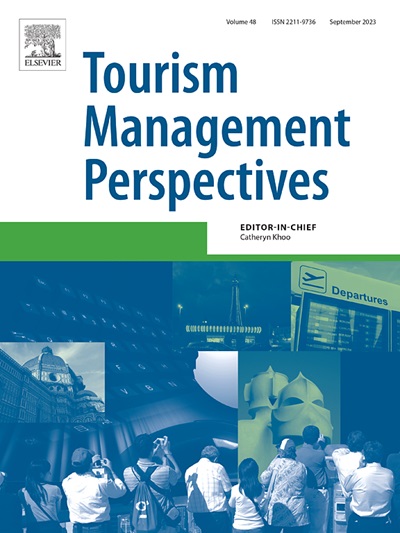How do current and anticipated positive emotions nudge tourists' pro-environmental behavior? Joint evidence from laboratory and field survey experiment studies
IF 6.9
2区 管理学
Q1 HOSPITALITY, LEISURE, SPORT & TOURISM
引用次数: 0
Abstract
The impact of emotions on tourists' pro-environmental behavior (PEB) has been a key issue in the field of tourism management research. This study investigates the nudging mechanism of positive emotions on tourist PEB through both laboratory and field survey experiment studies. Study 1 used a priming paradigm to study the nudging effect of positive emotions on tourist pro-environmental choices at both behavioral and neural activity levels. Study 2 further adopted a longitudinal research design to explore how two key components of individual positive emotions, current and anticipated emotions, jointly affect tourist pro-environmental choices. The results of Study 1 showed that emotional priming was better than rational and moral priming in nudging tourist pro-environmental choices. In addition, rational and moral nudging also affected individuals' anticipated emotional processes. The results of Study 2 further showed that a complex cross-lagged relationship existed between tourists' current and anticipated emotions and pro-environmental choices.
当前和预期的积极情绪如何影响游客的环保行为?来自实验室和实地调查实验研究的联合证据
情绪对游客亲环境行为(PEB)的影响一直是旅游管理研究领域的一个关键问题。本研究通过实验室和实地调查实验研究,探讨了积极情绪对游客亲环境行为的诱导机制。研究 1 采用引物范式,从行为和神经活动两个层面研究了积极情绪对游客亲环境选择的诱导效应。研究 2 进一步采用了纵向研究设计,探讨个体积极情绪的两个关键组成部分--当前情绪和预期情绪如何共同影响游客的环保选择。研究 1 的结果表明,在引导游客做出亲环境选择方面,情感引导优于理性和道德引导。此外,理性和道德引导也会影响个体的预期情感过程。研究 2 的结果进一步表明,游客的当前情绪和预期情绪与亲环境选择之间存在复杂的交叉滞后关系。
本文章由计算机程序翻译,如有差异,请以英文原文为准。
求助全文
约1分钟内获得全文
求助全文
来源期刊

Tourism Management Perspectives
Multiple-
CiteScore
15.60
自引率
3.40%
发文量
99
审稿时长
59 days
期刊介绍:
Tourism Management Perspectives is an interdisciplinary journal that focuses on the planning and management of travel and tourism. It covers topics such as tourist experiences, their consequences for communities, economies, and environments, the creation of image, the shaping of tourist experiences and perceptions, and the management of tourist organizations and destinations. The journal's editorial board consists of experienced international professionals and it shares the board with Tourism Management. The journal covers socio-cultural, technological, planning, and policy aspects of international, national, and regional tourism, as well as specific management studies. It encourages papers that introduce new research methods and critique existing ones in the context of tourism research. The journal publishes empirical research articles and high-quality review articles on important topics and emerging themes that enhance the theoretical and conceptual understanding of key areas within travel and tourism management.
 求助内容:
求助内容: 应助结果提醒方式:
应助结果提醒方式:


